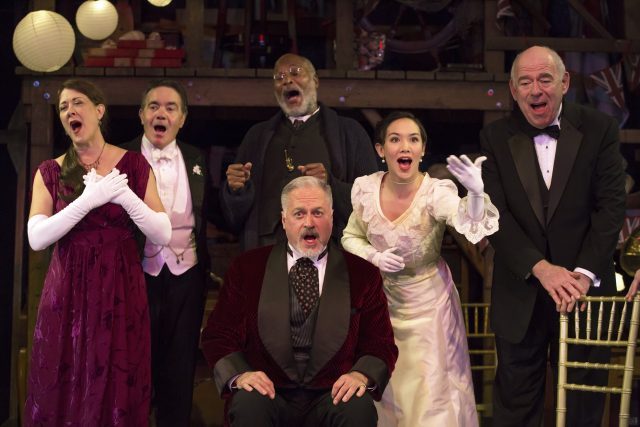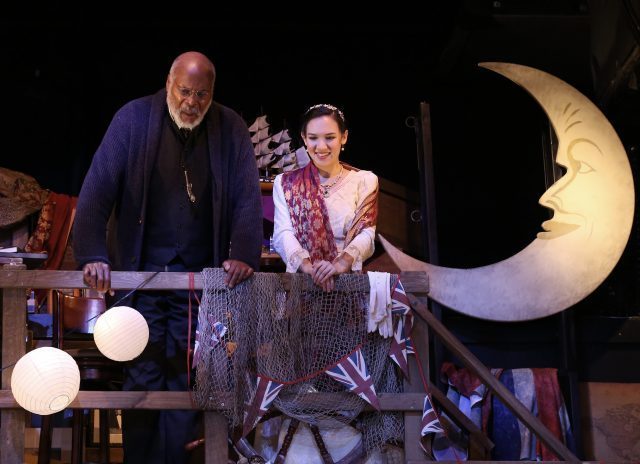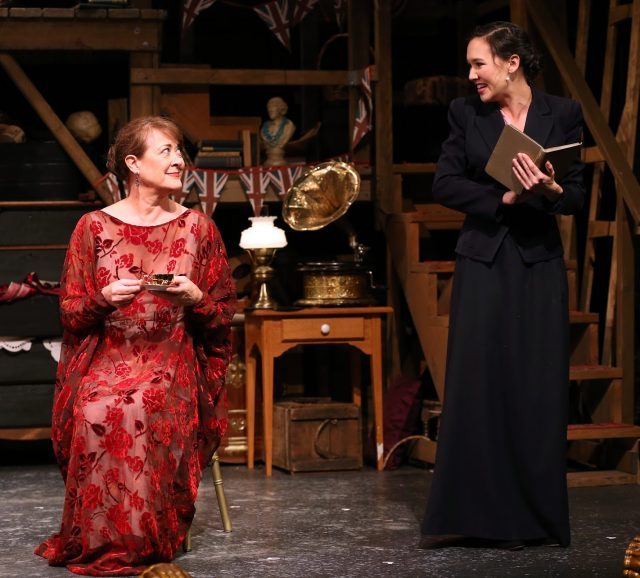
Gingold Theatrical Group presents a unique take on Shaw at the Lion Theatre (photo by Carol Rosegg)
The Lion Theatre at Theatre Row
410 West 42nd St. between Ninth & Tenth Aves.
Tuesday – Sunday through September 29, $69
gingoldgroup.org
www.theatrerow.org
The Lion Theatre at Theatre Row has been transformed into a London air-raid shelter during the Blitz for the world premiere of the Gingold Theatrical Group’s unique, rather scattershot adaptation of George Bernard Shaw’s Heartbreak House. Initially written as a Chekhov-inspired drama prior to WWI, tweaked after the war, and first performed in 1920, Heartbreak House was meant as a wake-up call to a complacent Britain. During WWII, the prominent English actress Hermione Gingold presented plays, including Heartbreak House, in a theater basement. “The notion of your audiences calling out for my dusty old play in the basement of your historic temple of art seems a suitable accompaniment to the dreaded nightly Beethoven,” Shaw wrote to Gingold about the work. “You will remember from our meeting last year that I had never been given the privilege of sharing my original manuscript until long after the graves had been filled and forgotten, requiring a substantial refashioning for its debut. Since our nightly All Clears are not greeting Londoners until the dawn I should think you would have abundant time to make it through to Keep the Home Fires Burning, and I urge you to avoid the wistful finale as published along with all those tiresome directives of people sleeping. It’s too late for that.” Now Gingold Theatrical Group founding artistic director David Staller — who named the company after the English star, a great friend of his — has refashioned the narrative, using the original handwritten version and adding elements from Shaw’s letters, various production scripts, and Gingold’s personal experiences to create a twenty-first-century iteration of the show. Unfortunately, it is haphazard and confusing, all over the place and no place at the same time.

Captain Shotover (Raphael Nash Thompson) and Ellie Dunn (Kimberly Immanuel) look down from above in Heartbreak House (photo by Carol Rosegg)
The play, originally subtitled A Fantasia in the Russian Manner on English Themes, is set in the ratty, dusty basement of London’s Ambassadors Theatre, where a valiant troupe and the audience have gathered as German bombers fly overhead. This night the company decides to present Heartbreak House, which Shaw saw as an activist, antiwar tale. It’s September 1914, and Ellie Dunn (Kimberly Immanuel) has arrived at the Sussex villa owned by the gruff Captain Shotover (Raphael Nash Thompson), having been invited by one of the captain’s daughters, Hesione Hushabye (Karen Ziemba). They are joined by Hesione’s sister, Lady Ariadne Utterword (Alison Fraser), who has been away a long time and is not immediately recognized by her sibling. Entering next are Mazzini Dunn (Lenny Wolpe), Ellie’s good-natured but not-so-savvy father, and wealthy industrialist Boss Mangan (Derek Smith), who is Ellie’s intended despite being much her elder and Ellie’s having fallen for a handsome stranger she met in the National Gallery — who turns out to be the dashing Hector Hushabye (Tom Hewitt), Hesione’s husband. A little later, Hesione is kissed by a mysterious gentleman who is actually Randall Utterword (Jeff Hiller, who plays several roles), her sister’s spouse. The rules of society, family dysfunction, and the end of the world all take on key roles in the show within a show, which can’t quite figure out if it’s a drawing-room farce, a romantic comedy, or a sociopolitical commentary.

Hesione Hushabye (Karen Ziemba) takes Ellie Dunn (Kimberly Immanuel) under her wing in Gingold’s WWII-set adaptation of Shaw’s Heartbreak House (photo by Carol Rosegg)
Barbara A. Bell’s costumes are elegantly comic and Brian Prather’s set is appropriately crowded, but Staller can’t make the best of the small theater. Many of the characters enter and leave by the rear door behind the audience, tramping up and down the solitary aisle in an endless march that quickly becomes distracting. The acting is inconsistent, as some of the cast play overblown caricatures and others keep it more down to earth, with Ziemba, Thompson, and Immanuel standing out. (The 1984 Broadway revival earned Tony nominations for Rex Harrison as Captain Shotover, Rosemary Harris as Hesione, Philip Bosco as Boss Mangan, and Dana Ivey as Lady Utterword.) Be prepared to sing along to such old-time ditties as “Pack Up Your Troubles in Your Old Kit-Bag” and “Let Me Call You Sweetheart”; the lyrics can be found in a pamphlet that includes information on what to do “in the event of an air raid” as well as an advert in which Hermione Gingold praises Ovaltine. “A man’s interest in the world is only the overflow from his interest in himself,” Shotover tells Ellie. “When you are a child your vessel is not yet full; so you care for nothing but your own affairs. When you grow up, your vessel overflows; and you are a politician, a philosopher, or an explorer and adventurer. In old age the vessel dries up: there is no overflow: you are a child again.” Despite a narrative that involves antiwar sentiment and class and gender differences, the Gingold production never feels fresh and relevant but instead remains more of a curiosity, a play cobbled together from too many ingredients in a way that can’t quite fill or overthrow the vessel.